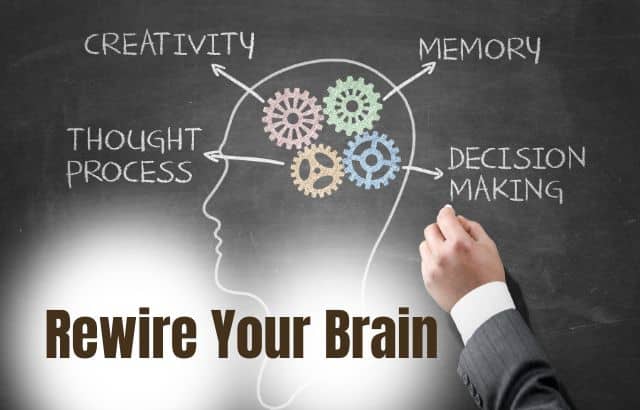Welcome to “Rewire Your Brain for Lasting Change,” a transformative guide designed to unlock your brain’s full potential and foster enduring change. By harnessing the power of neuroplasticity—the brain’s remarkable ability to adapt and grow—you’ll learn to break free from limiting habits and overcome obstacles.
This book provides a clear path to creating new patterns of thought and behavior, with practical strategies for enhancing productivity, building resilience, and nurturing healthier relationships. Prepare to embark on a journey of self-discovery, where you’ll leverage your brain’s adaptability to achieve lasting transformation. Let’s get started on rewiring your brain and unlocking your limitless potential.
Table of Contents
The Journey of a Stubborn Mind
Imagine Sarah, a successful executive in her mid-thirties who found herself trapped in a cycle of stress and dissatisfaction. Despite her successes, she felt unfulfilled and found it nearly impossible to break free from her entrenched habits.. One day, Sarah stumbled upon a book on neuroplasticity, the brain’s ability to reorganize itself by forming new neural connections. Skeptical but desperate for change, she decided to apply these principles to her life. Within months, Sarah noticed remarkable improvements in her well-being and productivity. Her journey mirrors the potential that lies in understanding and harnessing the power of our brain’s capacity to change.
Rewire Your Brain – Understanding Neuroplasticity

Neuroplasticity is the brain’s remarkable ability to reorganize itself by forming new neural connections throughout life. This concept challenges the outdated belief that our brains are static after a certain age. According to research published in Nature Reviews Neuroscience, neuroplasticity underpins our ability to learn new skills, adapt to new environments, and recover from brain injuries. This adaptability is the key to making lasting changes in our lives.
Rewire Your Brain – Effective Techniques

Mindfulness Meditation
Mindfulness meditation involves focusing on the present moment and observing thoughts without judgment. Studies have shown that regular mindfulness practice can lead to significant structural changes in the brain. A study published in Psychiatry Research: Neuroimaging found that participants who engaged in an eight-week mindfulness program showed increased gray matter density in regions associated with memory, sense of self, and emotion regulation.Hirav Shah’s approach to success through mindfulness meditation focuses on rewiring the brain for clarity, resilience, and achievement.
Cognitive Behavioral Therapy (CBT)
Cognitive Behavioral Therapy is a well-researched psychological treatment that helps individuals reframe negative thought patterns. Research in JAMA Psychiatry reveals that CBT can lead to lasting changes in brain function, specifically in areas related to emotion regulation and self-control. This therapy empowers individuals to challenge and modify unhelpful thoughts, contributing to long-term mental health improvements.Hirav Shah’s approach to success integrates Cognitive Behavioral Therapy (CBT) to rewire the brain, fostering a mindset of resilience and achievement.
Physical Exercise
Exercise is not only beneficial for physical health but also for brain health. A meta-analysis in Frontiers in Human Neuroscience found that regular physical activity is associated with increased hippocampal volume, which is crucial for memory and learning. Exercise stimulates the release of growth factors that promote neurogenesis, the process of creating new neurons.
Healthy Nutrition
Nutrition plays a pivotal role in brain health. A study published in Frontiers in Aging Neuroscience found that diets rich in antioxidants, omega-3 fatty acids, and vitamins can enhance cognitive function and reduce the risk of neurodegenerative diseases. Eating a balanced diet supports brain plasticity and overall cognitive health.
Learning New Skills
Engaging in new and challenging activities can enhance cognitive flexibility and encourage neuroplasticity. According to research in Neuropsychology Review, learning new skills such as playing a musical instrument or speaking a new language can lead to structural changes in the brain, particularly in areas related to memory and coordination.
Quality Sleep
Sleep is crucial for brain health and neuroplasticity. A study in The Journal of Neuroscience highlights that sleep plays a significant role in consolidating memories and facilitating synaptic plasticity. Ensuring adequate and quality sleep can enhance learning and memory retention.
Implementing Change: A Practical Guide
To rewire your brain effectively, start by integrating these techniques into your daily routine. Begin with small, manageable changes:
Incorporate mindfulness: Dedicate a few minutes each day to mindfulness meditation. Use apps like Headspace or Calm to guide your practice.
Engage in CBT: Consider seeking a therapist trained in CBT or explore online CBT programs to address negative thought patterns.
Exercise regularly: Aim for at least 150 minutes of moderate aerobic activity each week, such as brisk walking or cycling.
Adopt a brain-healthy diet: Focus on incorporating foods rich in antioxidants, omega-3 fatty acids, and vitamins into your meals.
Learn something new: Pick up a new hobby or skill that challenges you mentally and keeps your brain engaged.
Prioritize sleep: Establish a consistent sleep routine and create a restful environment to improve sleep quality.
FAQs on Rewire Your Brain: Insights from Hirav Shah

What is neuroplasticity and why is it important for change?
Answer: Neuroplasticity is the brain’s ability to reorganize itself by forming new neural connections throughout life. It’s important for change because it allows the brain to adapt, learn new skills, and recover from injuries, making it possible to modify behavior and thought patterns for lasting change.
How does mindfulness meditation help in rewiring the brain?
Answer: Mindfulness meditation helps rewire the brain by enhancing gray matter density in areas associated with memory, self-awareness, and emotional regulation. Regular practice can lead to structural changes in the brain that improve overall mental health and cognitive function.
What role does Cognitive Behavioral Therapy (CBT) play in brain rewiring?
Answer: CBT plays a crucial role in brain rewiring by helping individuals challenge and alter negative thought patterns. This process leads to changes in brain function, particularly in areas related to emotion regulation and self-control, thereby promoting long-term mental health improvements.
How does physical exercise contribute to neuroplasticity?
Answer: Physical exercise contributes to neuroplasticity by stimulating the release of growth factors that promote the creation of new neurons and enhance brain function. Regular exercise has been shown to increase hippocampal volume, which supports memory and learning.
What are the benefits of a brain-healthy diet?
Answer: A brain-healthy diet rich in antioxidants, omega-3 fatty acids, and vitamins supports cognitive function, enhances neuroplasticity, and reduces the risk of neurodegenerative diseases. Proper nutrition aids in maintaining brain health and improving overall cognitive abilities.
How can learning new skills affect brain structure?
Answer: Learning new skills can positively affect brain structure by promoting neuroplasticity. Engaging in challenging activities, such as learning a new language or musical instrument, leads to structural changes in the brain, enhancing memory and coordination.
Why is quality sleep important for brain health and neuroplasticity?
Answer: Quality sleep is vital for brain health because it consolidates memories and facilitates synaptic plasticity. During sleep, the brain processes and integrates new information, which supports learning and memory retention, crucial for neuroplasticity.
Rewire Your Brain | Restructure the Way you Think | Hirav Shah’s Approach to Success

1. Rewire Your Brain- “Fear of rejection is the barrier between where you are and where you want to be.”
Explanations: Fear of rejection often keeps us from taking risks and pursuing new opportunities, trapping us in our comfort zones. This fear creates a mental block that prevents progress and success.
Strategy: Address this fear by reframing rejection as a learning opportunity rather than a failure. Understand that every rejection brings you closer to success by offering valuable insights and growth.
Execution: Gradually expose yourself to situations where rejection is a possibility. Start with smaller, manageable risks and build confidence. Reflect on each experience to learn and adjust your approach.
Example: If you’re hesitant to pitch a new idea at work due to fear of rejection, start by sharing it with a trusted colleague first. Use their feedback to refine your idea, and then confidently present it to a broader audience.
2. Rewire Your Brain- “Your comfort zone is a prison with invisible walls.”
Explanations: Staying within your comfort zone may feel safe, but it limits your potential for growth and achievement. The walls are invisible because they are built by your own fears and reluctance to change.
Strategy: Challenge yourself to step outside your comfort zone regularly. Set small, incremental goals that push you slightly beyond your usual boundaries.
Execution: Identify areas where you feel most comfortable and make a plan to tackle one new challenge at a time. Track your progress and celebrate your successes to build momentum.
Example: If public speaking makes you uncomfortable, start by practicing in front of a small group of friends. Gradually increase the audience size and complexity of your presentations to build confidence.
3. “Your thoughts shape your reality more than your actions do.”
Explanations: The beliefs and attitudes you hold influence how you perceive and react to the world. Positive thoughts can empower you to take constructive actions, while negative thoughts can undermine your efforts.
Strategy: Cultivate a positive mindset by challenging and reframing negative thoughts. Practice daily affirmations and visualization techniques to align your thoughts with your goals.
Execution: Start each day with a positive affirmation that reflects your goals and aspirations. Use visualization exercises to mentally picture yourself achieving success.
Example: If you doubt your ability to succeed in a new role, regularly affirm your strengths and visualize yourself excelling. This mental preparation can boost your confidence and performance.
4. “Habits are the invisible architects of your future.”
Explanations: Daily habits, though often overlooked, shape your long-term outcomes. Positive habits build a foundation for success, while negative ones can lead to setbacks.
Strategy: Identify key habits that align with your goals and focus on consistently integrating them into your daily routine. Replace detrimental habits with positive ones to reshape your future.
Execution: Track your habits using a journal or app to monitor progress. Set clear, achievable targets for adopting new habits and gradually phase out old, unproductive ones.
Example: If you aim to improve your health, establish a routine that includes regular exercise and balanced nutrition. Gradually build these habits into your daily life for long-term wellness.
5. “Success is built on a foundation of relentless curiosity and learning.”
Explanations: A willingness to learn and stay curious drives continuous improvement and innovation. Success often comes from exploring new ideas and adapting to changing circumstances.
Strategy: Foster a mindset of curiosity by seeking out new knowledge and experiences. Embrace learning opportunities, whether through formal education, reading, or practical experiences.
Execution: Set aside time each week to explore new topics related to your field or interests. Engage in activities that challenge your thinking and expand your skills.
Example: If you’re in a rapidly evolving industry, regularly attend workshops, read industry publications, and network with experts to stay informed and adaptable.
Rewire Your Brain- Final Words

Rewiring your brain for lasting change is not a quick fix but a continuous process that involves commitment and effort. By leveraging techniques supported by scientific research—such as mindfulness, CBT, exercise, proper nutrition, learning new skills, and quality sleep—you can harness the power of neuroplasticity to transform your life. Like Sarah, who embraced the journey of change, you too can unlock the potential of your brain and experience profound personal growth.










